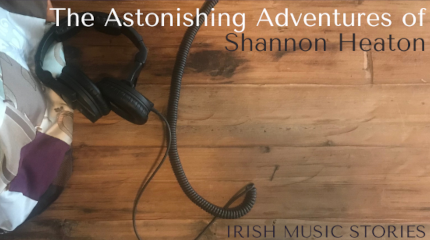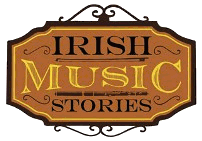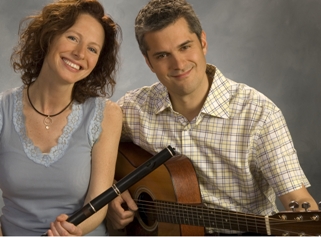


Irish Music Stories, Season 6:
The Irish Music Stories project explores Irish, Scottish, and other Celtic traditions. Through podcasts, essays, and bonus content, producer Shannon Heaton weaves together music and conversations with luminaries from the “trad” world. It’s six seasons of culture, history, and art exploration through an Irish music lens.
Episode 69: Tea, Turf, and Wooden Spoons. In this month's episode of the Irish Music Stories Podcast, I reflect on dance tunes that commemorate ordinary events and items (the lunch routines, the laundry, the kitchen implements, the kid art supplies). This stuff shapes lives, but doesn't always make it into the photo albums... or tune books. Hear about a few tunes like the Cup of Tea, the Bundle of Turf, the Little Wooden Spoon... and the stories behind them
Episode 68: 20 Years of BCMFest. Presenting concerts can be about a lot more than throwing someone onstage. Matt Smith manages Club Passim in Cambridge, Massachusetts, which has been the central venue and fountain of support for 20 years—and is now the official presenter—for Boston’s Celtic Music Festival. For Matt, it’s all about creating opportunities for something special and unique to happen. Learn about where this little festival has been, and where it’s going, with or without your Mouse Pants!
Episode 67: Hunting for Wren Tunes and Tales. Why did kids carry dead birds on sticks all over Ireland on the 26th of December? And what did this all have to do with first century Christian martyr St. Stephen? Just like traditional tunes, which can vary from player to player, the whole history of Wren Day depends on the storyteller. Learn more about the role a melody, a good story (or three), and a tiny bird has played in the centuries-long winter tradition of hunting the wren.
Episode 66: Up in Smoke. Loss can inspire achingly beautiful music. It can also spark new forms of creativity for musicians. This episode is a meditation on the stubborn insistence and the transformative power of creativity, featuring beautiful conversations with Emmanuelle LeBlanc about Pastelle LeBlanc; Joe DeZarn and Tina Eck about Graham DeZarn; Daniel Neely about Mick Moloney; and a poem from Brian O’Donovan. Here’s to sowing beauty and blooming from the muck of misfortune.
Episode 65: Cutting Routes and Tracing Roots. What makes a tune Irish? What makes it American? Take a ride on the Heaton railroad to trace Irish, old time, and Quebecois versions of the same tune.
Episode 64: O'Farrell's Trip to Texas. Irish music and storytelling is mostly an oral/aural thing, right? And yet, printed music and souvenirs don't just help with pedagogy. They hold meaning, and connect us with history, and with one another. In this month's installment of the Irish Music Stories podcast, Laura Flanagan, Dáibhí Ó Cróinín, and Aedín Clements tell tales of unexpected finds, surprising connections, and the grace of good fortune.
Episode 62: Daughters, Maids, and Boys. Considering bonny, hale and hearty Irish tunes. Most Irish traditional tunes have names. Some go by many different names. So what’s in a name? Do names help us associate tunes with people, or remember vast numbers of melodies… or is there another agenda afoot? In this episode, Colm Gannon, Nic Gareiss, Mick Moloney—and renowned 20th century literary figures Dick and Jane—explore the meaning behind the names.
Episode 61: Rounding up the the Tunes. An investigation of Francis O’Neill’s fascinating hobby. When flute player and Police Captain Francis O’Neill published his first and most extensive collection of Irish tunes in 1903, he included a LOT of tunes. Nicholas Carolan called it “the largest snapshot of this music ever taken in its 9,000 year history.” 120 years later, I revisit O’Neill’s two biggest books, to explore what’s in there, and what isn’t. With the help of authors Michael O’Malley and Ronan O’Driscoll, librarian Aedin Clements, and fiddle player/scholar Laura Flanagan, I attempt to deepen (and maybe even adjust) my perspective on this heavy piece of the Irish music foundation.
Episode 60: Selma and Rose. Most of the Irish traditional jigs and reels I play have associations, information, history, and sentiments bundled into them. Even these dance tunes that have no words carry so much. And everybody who plays these tunes bears and shares more than just a few notes and rhythms. In this episode, flute player and piper Emer Mayock, harp player Andrea Kiupel-Grona, and banjo/harmonica player Don Meade share Rose in the Heather and Maid of Selma lore.

Episode 59: Shortcut to the Heart. Irish Music Stories is the show about traditional music and the bigger stories behind it, like how important, ancient songs and little short folk ditties lodge in the heart, not the ears… or the eyes. In this episode, fiddle player Séamus Connolly shares early experiences of playing and collecting Irish music, and also recent challenges and insights. Also woven into the show are a few thoughts from poet and scholar Louis de Paor about tradition and innovation, and how the structure of old ballads and poems can resonate today.
CHECK OUT all six seasons and companion chapters HERE!
Coping with loss
Oh, friends. Some very dear musicians have died. I am so sad about the recent loss of Dennis Cahill, Graham DeZarn, and Mick Moloney. And of many other important, memorable people over the last few months, including Seamus Tansey. My condolences to all the family, friends, and bereaved. I am wondering how to respond... and how to chip in. I have found some power with in-person and online events this month, including a Zoom class and a Virtual Session. I really do think there's some use in focusing on something TOGETHER--even if it's 'just' learning and playing a tune. Listening, connecting with, and tapping in to players who are better... who are less experienced... who live in different places: there is something small and simple about this. Not all revolutionary acts are drastic. In fact, bringing people together in music and focusing on creativity is something that Dennis, Graham, and Mick did so well. So maybe one other thing I can do is share a few stories about my friends. Because they were important to me and to Irish music.

I'll start my story corner with Dennis Cahill. Dennis was known for his work with fiddle player Martin Hayes. And he was one of the most inspiring guitar players we Heatons have ever known. Just out of college, Matt called him for a lesson. I'd also met Dennis a few times; and since Matt and I were dating at that point, Dennis told Matt to bring me along. We arrived to a dinner he'd prepared for us. And it was one of the nicest nights of food, music, and corny jokes we'd ever had. Over the years we had the privilege and pleasure of hearing Dennis. His presence onstage with Martin, Jimmy Keane, and others… and also the chord voicings he used to color tunes… it’s all had a profound effect on both of us. But in fact, Dennis also came to a number of our gigs. He’d be there, quietly in the back, and afterwards always had a kind word (and a corny joke). He knew what supporting other people was all about, and his music embodied that. It was about really listening, and lifting up other people, and tapping in to what’s going on.
Graham DeZarn was known to many in the Irish and American music worlds as a great fiddle player and kind soul. He was also wicked funny. And there aren’t a million people I can push the envelope with like I could with him. I came to know Graham while working with the ensemble Childsplay. Did I start in maybe 2007 or 8? Well, at all those shows and rehearsals, Graham and I spent a LOT of time backstage playing tunes, and many hours in the back of the bus talking about life. Two of our big themes were how to fix things (a natural passion of mine) and how to accept things (less natural for me—Graham taught me a lot about that, and I’m challenged to accept the fact that he’s gone). Nearly ten years ago we started doing this song Dear Companion https://www.youtube.com/watch?v=JB11MnyDeDY with the band. Our mutual pal Hanneke Cassel had arranged it beautifully, but there was a little room at the end for improv. Every time we played it, Graham and I would try to come up with a few crunchy chords that would (not totally, but kinda) interfere with the harmonies. It was our little game, and sometimes we were wilder with it than others. We started calling each other Dear Effing Companion. I loved those tiny musical moments, because they kinda summed up our friendship and they epitomized Graham: creative, silly, subversive without harm, fixing and accepting a situation that was filled with more rules than either of us always wanted to follow...
When I was first learning Irish music, I went to the now defunct Irish week at the Augusta Heritage Center in Elkins, West Virginia, a camp that Mick Moloney founded in 1982, just 9 years after coming to America from Limerick. This camp was one of MANY projects he created to give other people opportunities to play, to hear, to learn about, and to engage with Irish music. So that’s where I first met Mick.. in maybe 1990? As he did with countless other people—newer players, seasoned musicians, everyone—Mick welcomed me into the circle. Pulled up a chair for me. Introduced me to the players beside him. But when he learned that I spoke Thai, we connected about that for the rest of the week. Before my time at the camp, I’d already heard Mick playing guitar and banjo on recordings, and I recognized his name from album liner notes and book intros. But it added a special dimension to our relationship to have this non Irish music bond. About 20 years ago, Mick began visiting and helping raise funds for the kids at the Mercy Centre (where Father Joe Maier and the Mercy Centre family offer a refuge to orphans, street children, and children and adults with AIDS from the many slums of Bangkok). Matt and I met Mick there a few times to play for and sit with the kids; and he coordinated many other musicians to visit the centre. He also took us out to a foreigner bar in Bangkok once—I am SO not accustomed to that scene, being oriented in more rural/quiet/Thai speaking part of Thailand (#UpSuphan). But it was such a fun and funny night. Mick loved introducing us to the Filipino cover band that could literally imitate ANYBODY. And then Stateside it was always a treat to encounter Mick. And it was inspiring and amazing to be part of shows he organized—for a Christmas show, or a benefit for the Mercy Centre.They always brought together so many disparate musicians, though all of us were connected to Mick and aware of his colossal role in Irish music. Chicago accordion player Jimmy Keane wrote “no person other than maybe Captain Francis O’Neill has had the greatest influence and impact on Irish music in America.” Indeed, Mick promoted traditional music, organized events, counseled scholars, and encouraged musicians so widely, there's no measure of the extent of his influence on Irish music. But in addition to all the vibrant and active projects he stirred up in America and Ireland, there are also some pretty big shoes he’s left behind in Thailand.
While grieving, it feels a little absurd and inconsequential to mention forthcoming events and small news. But also, we are so lucky that life does go on. And that it is real, earnest, and sometimes quite banal. Here's to the transcendent legacy our friends can leave.... while we keep weeding the garden, taking out the trash, and doing a few sessions, classes, and gigs.
Please take good care. Shannon
Photo Credits:
(1)-(2) Irish Music Stories,
(3)-(4) Shannon & Matt Heaton,
(5) Martin Hayes & Dennis Cahill
(unknown/website).